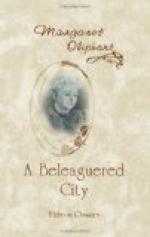’You do not agree with me? Well! the opinion of a man like M. Paul Lecamus is always worthy to be heard.’
‘Oh!’ he said, ’I am called visionary. I am not supposed to be a trustworthy witness. Nevertheless, if M. Le Maire will come with me, I will show him something that is very strange—something that is almost more wonderful than the darkness—more strange,’ he went on with great earnestness, ‘than any storm that ever ravaged Burgundy.’
’That is much to say. A tempest now when the vines are in full bearing—’
’Would be nothing, nothing to what I can show you. Only come with me to the Porte St. Lambert.’
‘If M. le Maire will excuse me,’ said M. Barbou, ’I think I will go home. It is a little cold, and you are aware that I am always afraid of the damp.’ In fact, our coats were beaded with a cold dew as in November, and I could not but acknowledge that my respectable colleague had reason. Besides, we were close to his house, and he had, no doubt, the sustaining consciousness of having done everything that was really incumbent upon him. ‘Our ways lie together as far as my house,’ he said, with a slight chattering of his teeth. No doubt it was the cold. After we had walked with him to his door, we proceeded to the Porte St. Lambert. By this time almost everybody had re-entered their houses. The streets were very dark, and they were also very still. When we reached the gates, at that hour of the night, we found them shut as a matter of course. The officers of the octroi were standing close together at the door of their office, in which the lamp was burning. The very lamp seemed oppressed by the heavy air; it burnt dully, surrounded with a yellow haze. The men had the appearance of suffering greatly from cold. They received me with a satisfaction which was very gratifying to me. ‘At length here is M. le Maire himself,’ they said.
‘My good friends,’ said I, ’you have a cold post to-night. The weather has changed in the most extraordinary way. I have no doubt the scientific gentlemen at the Musee will be able to tell us all about it—M. de Clairon—’
‘Not to interrupt M. le Maire,’ said Riou, of the octroi, ’I think there is more in it than any scientific gentleman can explain.’
‘Ah! You think so. But they explain everything,’ I said, with a smile. ‘They tell us how the wind is going to blow.’
As I said this, there seemed to pass us, from the direction of the closed gates, a breath of air so cold that I could not restrain a shiver. They looked at each other. It was not a smile that passed between them—they were too pale, too cold, to smile but a look of intelligence. ‘M. le Maire,’ said one of them, ‘perceives it too;’ but they did not shiver as I did. They were like men turned into ice who could feel no more.
‘It is, without doubt, the most extraordinary weather,’ I said. My teeth chattered like Barbou’s. It was all I could do to keep myself steady. No one made any reply; but Lecamus said, ’Have the goodness to open the little postern for foot-passengers: M. le Maire wishes to make an inspection outside.’




